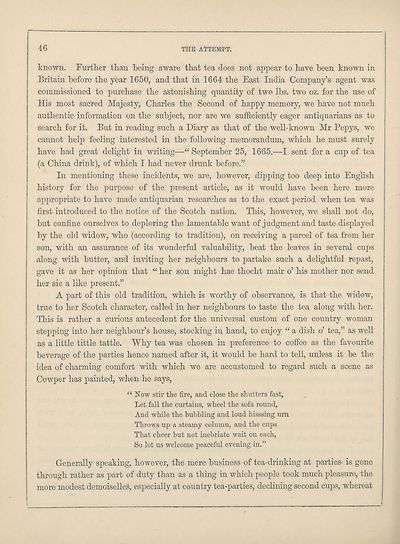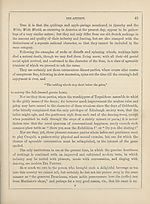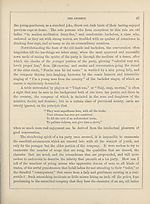Attempt > Volume 1 and Select writings
(344) Page 46
Download files
Complete book:
Individual page:
Thumbnail gallery: Grid view | List view

46
THE ATTEMPT.
known. Further than being aware that tea does not appear to have been known in
Britain before the year 1650, and that in 1664 the East India Company’s agent was
commissioned to purchase the astonishing quantity of two lbs. two oz. for the use of
His most sacred Majesty, Charles the Second of happy memory, we have not much
authentic information on the subject, nor are we sufficiently eager antiquarians as to
search for it. But in reading such a Diary as that of the well-known Mr Pepys, we
cannot help feeling interested in the following memorandum, which he must surely
have had great delight in writing—“September 25, 1665.—I sent for a cup of tea
(a China drink), of which I had never drunk before.”
In mentioning these incidents, we are, however, dipping too deep into English
history for the purpose of the present article, as it would have been here more
appropriate to have made antiquarian researches as to the exact period when tea was
first introduced to the notice of the Scotch nation. This, however, we shall not do,
but confine ourselves to deploring the lamentable want of judgment and taste displayed
by the old widow, who (according to tradition), on receiving a parcel of tea from her
son, with an assurance of its wonderful valuahility, heat the leaves in several cups
along with butter, and inviting her neighbours to partake such a delightful repast,
gave it as her opinion that “ her son might hae thocht mair o’ his mother nor send
her sic a like present.”
A part of this old tradition, which is worthy of observance, is that the widow,
true to her Scotch character, called in her neighbours to taste the tea along with her.
This is rather a curious antecedent for the universal custom of one country woman
stepping into her neighbour’s house, stocking in hand, to enjoy “a dish o’ tea,” as well
as a little tittle tattle. Why tea was chosen in preference to coffee as the favourite
beverage of the parties hence named after it, it would he hard to tell, unless it he the
idea of charming comfort with which we are accustomed to regard such a scene as
Cowper has painted, when he says,
“Now stir the fire, and close the shutters fast,
Let fall the curtains, wheel the sofa round,
And while the huhbling and loud hisssing urn
Throws up a steamy column, and the cups
That cheer but not inebriate wait on each,
So let us welcome peaceful evening in.”
Generally speaking, however, the mere business of tea-drinking at parties- is gone
through rather as part of duty than as a thing in which people took much pleasure, the
more modest demoiselles, especially at country tea-parties, declining second cups, whereat
THE ATTEMPT.
known. Further than being aware that tea does not appear to have been known in
Britain before the year 1650, and that in 1664 the East India Company’s agent was
commissioned to purchase the astonishing quantity of two lbs. two oz. for the use of
His most sacred Majesty, Charles the Second of happy memory, we have not much
authentic information on the subject, nor are we sufficiently eager antiquarians as to
search for it. But in reading such a Diary as that of the well-known Mr Pepys, we
cannot help feeling interested in the following memorandum, which he must surely
have had great delight in writing—“September 25, 1665.—I sent for a cup of tea
(a China drink), of which I had never drunk before.”
In mentioning these incidents, we are, however, dipping too deep into English
history for the purpose of the present article, as it would have been here more
appropriate to have made antiquarian researches as to the exact period when tea was
first introduced to the notice of the Scotch nation. This, however, we shall not do,
but confine ourselves to deploring the lamentable want of judgment and taste displayed
by the old widow, who (according to tradition), on receiving a parcel of tea from her
son, with an assurance of its wonderful valuahility, heat the leaves in several cups
along with butter, and inviting her neighbours to partake such a delightful repast,
gave it as her opinion that “ her son might hae thocht mair o’ his mother nor send
her sic a like present.”
A part of this old tradition, which is worthy of observance, is that the widow,
true to her Scotch character, called in her neighbours to taste the tea along with her.
This is rather a curious antecedent for the universal custom of one country woman
stepping into her neighbour’s house, stocking in hand, to enjoy “a dish o’ tea,” as well
as a little tittle tattle. Why tea was chosen in preference to coffee as the favourite
beverage of the parties hence named after it, it would he hard to tell, unless it he the
idea of charming comfort with which we are accustomed to regard such a scene as
Cowper has painted, when he says,
“Now stir the fire, and close the shutters fast,
Let fall the curtains, wheel the sofa round,
And while the huhbling and loud hisssing urn
Throws up a steamy column, and the cups
That cheer but not inebriate wait on each,
So let us welcome peaceful evening in.”
Generally speaking, however, the mere business of tea-drinking at parties- is gone
through rather as part of duty than as a thing in which people took much pleasure, the
more modest demoiselles, especially at country tea-parties, declining second cups, whereat
Set display mode to: Large image | Transcription
Images and transcriptions on this page, including medium image downloads, may be used under the Creative Commons Attribution 4.0 International Licence unless otherwise stated. ![]()
| Ladies' Edinburgh Debating Society publications > Attempt > Volume 1 and Select writings > (344) Page 46 |
|---|
| Permanent URL | https://digital.nls.uk/109869082 |
|---|
| Attribution and copyright: |
|
|---|

